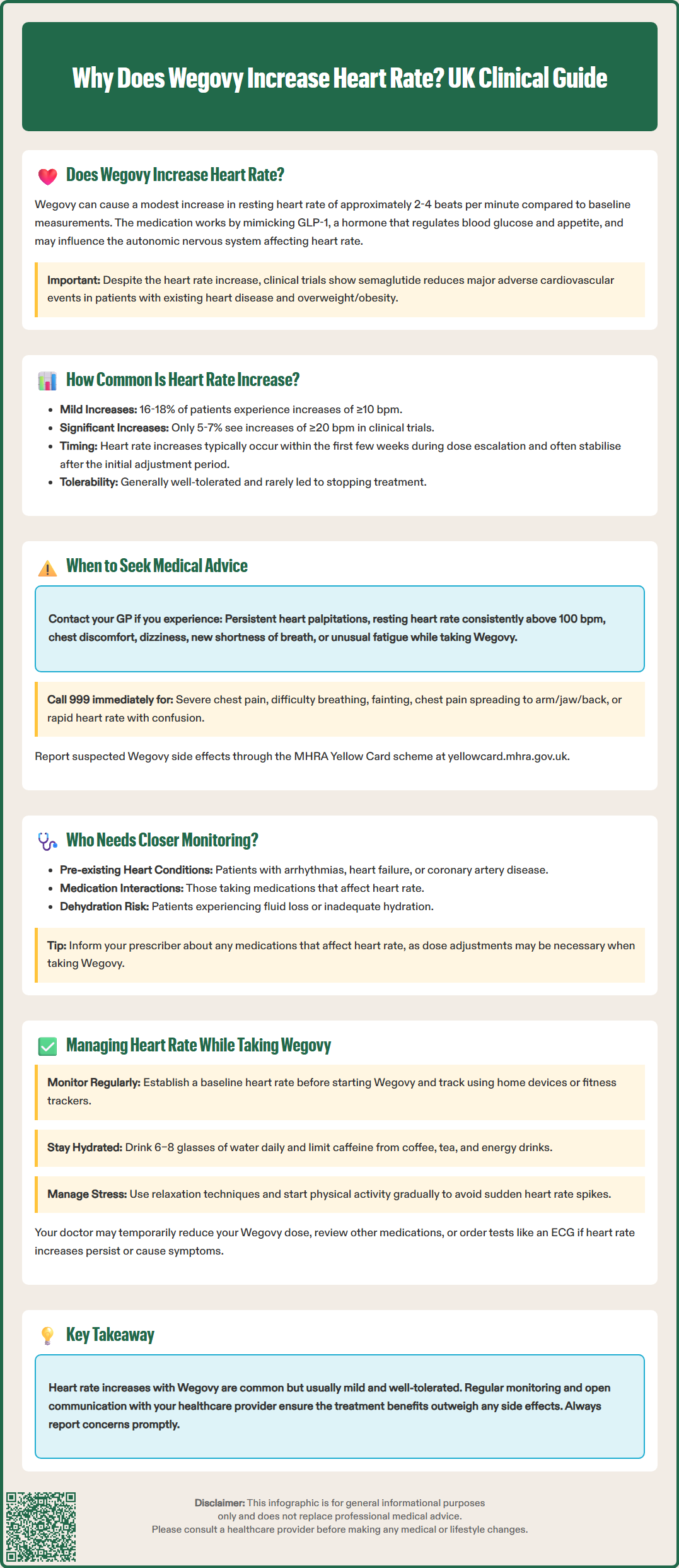
Wegovy (semaglutide), a GLP-1 receptor agonist prescribed for weight management, can cause a modest increase in heart rate in some patients. Clinical trials have documented mean increases of approximately 2–4 beats per minute, with some individuals experiencing larger changes. Whilst this cardiovascular effect is generally well-tolerated, understanding why it occurs, how common it is, and when to seek medical advice is essential for safe treatment. This article examines the mechanisms behind heart rate changes with Wegovy, monitoring strategies, and guidance on managing this side effect in line with UK clinical practice.
Quick Answer: Wegovy can increase heart rate by approximately 2–4 beats per minute through mechanisms that may involve GLP-1 receptor activation affecting the autonomic nervous system, though the exact pathway remains uncertain.

Mounjaro® is the most innovative GLP-1 medication proven to dramatically curb appetite, hunger, and cravings to help professional men achieve substantial weight loss.
Start Here
Wegovy® is a weekly injectable GLP-1 medication with proven effectiveness in reducing appetite, hunger, and cravings to help busy professionals lose significant weight.
Start HereWegovy (semaglutide) can cause an increase in heart rate in some individuals, though this effect is generally modest. According to the UK Summary of Product Characteristics (SmPC), clinical trials have shown that semaglutide may lead to a mean increase in resting heart rate of approximately 2-4 beats per minute compared to baseline measurements. This cardiovascular effect has been observed across studies involving GLP-1 receptor agonist medications.
The mechanism behind this heart rate increase is not fully understood, but several theories exist. GLP-1 receptor agonists like semaglutide work by mimicking the action of glucagon-like peptide-1, a naturally occurring hormone that regulates blood glucose levels and appetite. These receptors are present in various tissues, and their activation may potentially influence the autonomic nervous system, which could affect heart rate regulation, though the exact pathway remains uncertain.
Additionally, the significant weight loss achieved with Wegovy may influence various cardiovascular parameters. As patients lose substantial amounts of weight, metabolic and haemodynamic changes occur throughout the body. The heart rate increase may occur irrespective of weight loss; the precise mechanism remains uncertain.
It is important to note that whilst heart rate increases have been documented, the SELECT cardiovascular outcome trial demonstrated that semaglutide reduces the risk of major adverse cardiovascular events in patients with established cardiovascular disease and overweight/obesity. However, this study population had specific characteristics, and results should be interpreted within that context.

Heart rate increases with Wegovy are relatively common but typically mild in nature. According to the UK SmPC, in the STEP clinical trials, heart rate increases of ≥10 beats per minute (bpm) from baseline occurred in 16.0% to 18.4% of Wegovy-treated patients compared to 11.1% to 15.8% in the placebo group. Increases of ≥20 bpm were observed in 4.6% to 7.1% of Wegovy patients versus 3.6% to 4.9% with placebo.
In the STEP (Semaglutide Treatment Effect in People with obesity) clinical trial programme, which evaluated Wegovy for weight management, the mean increase in heart rate ranged from 2 to 4 beats per minute across different trials, with some individual patients experiencing larger increases. Importantly, these increases were generally well-tolerated and did not lead to treatment discontinuation in most cases.
Certain patient populations may potentially be more susceptible to heart rate changes:
Patients with pre-existing cardiovascular conditions may notice heart rate changes more readily
Individuals taking other medications that affect heart rate (such as sympathomimetics, decongestants, or certain antidepressants) may experience effects on heart rate
Those with underlying medical conditions may have altered responses
Patients who are dehydrated or experiencing gastrointestinal side effects may have temporary heart rate elevations
The timing of heart rate increases can vary. Some patients notice changes within the first few weeks of treatment, particularly during dose escalation, whilst others may develop this effect later in their treatment course. The heart rate increase often stabilises after the initial adjustment period, though it may persist throughout treatment in some individuals. Monitoring during treatment helps identify those who experience more significant changes requiring clinical attention.
Patients should contact their GP or healthcare provider if they experience concerning symptoms related to heart rate whilst taking Wegovy. Whilst modest increases in heart rate are generally well-tolerated, certain signs and symptoms warrant prompt medical evaluation to ensure patient safety and appropriate management.
Seek medical advice if you experience:
Persistent palpitations – a sensation of your heart racing, pounding, or fluttering that lasts for extended periods or occurs frequently
Resting heart rate consistently above 100 beats per minute – particularly if this represents a significant change from your baseline
Chest pain or discomfort – any chest tightness, pressure, or pain, especially if accompanied by shortness of breath
Dizziness or lightheadedness – particularly if severe or associated with near-fainting episodes
Shortness of breath – difficulty breathing at rest or with minimal exertion that is new or worsening
Unusual fatigue or weakness – extreme tiredness that interferes with daily activities
Seek emergency medical attention (call 999) if you experience:
Severe chest pain or pressure
Difficulty breathing or severe shortness of breath
Fainting or loss of consciousness
Chest pain radiating to the arm, jaw, or back
Rapid heart rate accompanied by confusion or altered mental state
Patients with pre-existing heart conditions, including arrhythmias, heart failure, or coronary artery disease, should have closer monitoring and may benefit from more frequent follow-up appointments. Those taking medications that affect heart rate should inform their prescriber, as dose adjustments may be necessary. Cardiovascular assessment may be performed as clinically indicated for patients on weight management medications, particularly those with existing cardiovascular risk factors.
If you suspect you're experiencing side effects from Wegovy, you can report these through the MHRA Yellow Card scheme (yellowcard.mhra.gov.uk).
Effective management of heart rate changes whilst taking Wegovy involves a combination of monitoring, lifestyle modifications, and clinical oversight. Most patients can continue treatment safely with appropriate precautions and assessment by their healthcare team.
Monitoring strategies include:
Baseline heart rate measurement before starting Wegovy to establish your normal range
Regular self-monitoring using a home blood pressure monitor with heart rate function or a fitness tracker
Recording symptoms in a diary to identify patterns or triggers
Follow-up appointments with your GP or prescribing clinician as clinically indicated
Lifestyle modifications that may help:
Adequate hydration – dehydration can exacerbate heart rate increases; aim for 6–8 glasses of water daily
Limiting caffeine intake – coffee, tea, energy drinks, and certain medications contain caffeine that can elevate heart rate
Stress management – anxiety and stress can increase heart rate; consider relaxation techniques, mindfulness, or breathing exercises
Gradual physical activity – whilst exercise is beneficial, start slowly and increase intensity gradually, particularly if you notice heart rate changes
Avoiding excessive alcohol – alcohol can affect heart rate and interact with cardiovascular function
For patients experiencing persistent or bothersome heart rate increases, your prescriber may consider:
Temporarily reducing the Wegovy dose to assess whether symptoms improve
Reviewing other medications that might contribute to heart rate elevation
Arranging additional investigations such as an electrocardiogram (ECG) or 24-hour heart rate monitoring
Referral to a cardiologist if there are concerns about underlying cardiac conditions
Dose adjustment or discontinuation if clinically significant, sustained resting tachycardia or symptomatic palpitations persist
The decision to continue Wegovy should be made in consultation with your healthcare provider, who will weigh the benefits of treatment against any side effects you may be experiencing. Remember to report any suspected side effects to your healthcare provider and through the MHRA Yellow Card scheme (yellowcard.mhra.gov.uk).
Modest heart rate increases of 2–4 beats per minute are generally well-tolerated and do not typically require treatment discontinuation. However, patients should seek medical advice if they experience persistent palpitations, chest pain, dizziness, or a resting heart rate consistently above 100 bpm.
Heart rate increases may occur within the first few weeks of treatment, particularly during dose escalation, and often stabilise after the initial adjustment period. In some individuals, the modest elevation may persist throughout treatment.
Yes, establishing a baseline heart rate before starting Wegovy and regular self-monitoring using a home blood pressure monitor or fitness tracker is recommended. Patients should attend follow-up appointments as clinically indicated and report any concerning symptoms to their healthcare provider.
All medical content on this blog is created based on reputable, evidence-based sources and reviewed regularly for accuracy and relevance. While we strive to keep content up to date with the latest research and clinical guidelines, it is intended for general informational purposes only.
DisclaimerThis content is not a substitute for professional medical advice, diagnosis, or treatment. Always consult a qualified healthcare professional with any medical questions or concerns. Use of the information is at your own risk, and we are not responsible for any consequences resulting from its use.